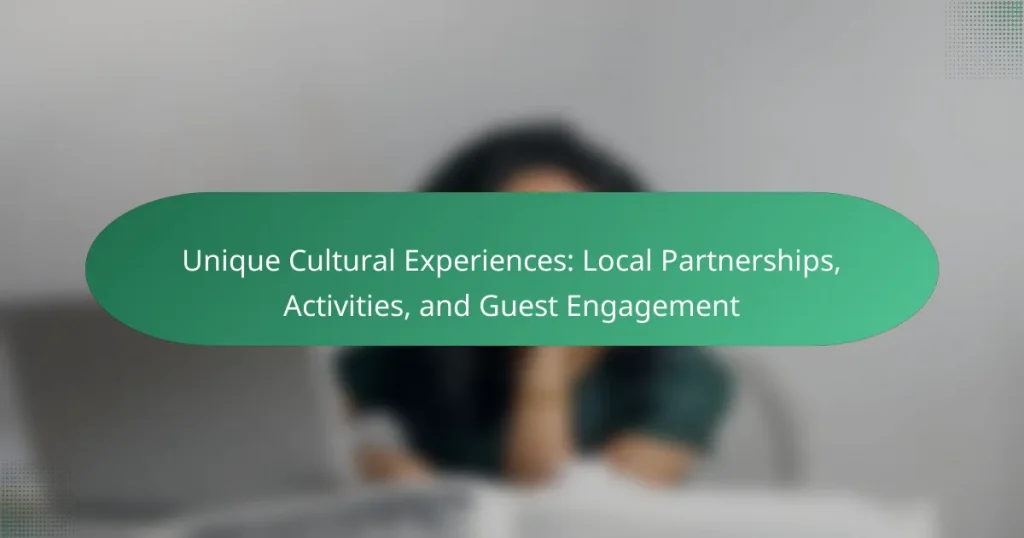Unique cultural experiences are activities or events that highlight the traditions and customs of specific communities, often facilitated through local partnerships. These experiences, such as traditional cooking classes, artisan workshops, and cultural festivals, allow visitors to engage directly with local practices and foster deeper connections with the community. By promoting understanding of diverse cultures, these activities contribute to local economies and create lasting memories for participants. Enhanced engagement through interactive workshops and personalized experiences increases visitor satisfaction and encourages authentic interactions, making these cultural experiences more meaningful.

What Are Unique Cultural Experiences?
Unique cultural experiences are distinct activities or events that showcase the traditions and customs of a specific community. These experiences often involve local partnerships that enhance authenticity. They provide opportunities for visitors to engage directly with cultural practices. Examples include traditional festivals, culinary classes, and artisan workshops. Such experiences promote understanding and appreciation of diverse cultures. They also support local economies by involving community members. Unique cultural experiences create lasting memories for participants. They foster connections between visitors and hosts, enriching the travel experience.
How Do Unique Cultural Experiences Enhance Travel?
Unique cultural experiences enhance travel by providing deeper insights into local traditions and lifestyles. These experiences foster authentic connections between travelers and local communities. Engaging with unique cultural practices can lead to memorable interactions. For example, participating in local festivals allows travelers to witness traditional customs firsthand. Studies show that travelers who engage in cultural experiences report higher satisfaction levels. According to a 2018 study by the World Tourism Organization, cultural tourism is growing at a rate of 15% annually. This growth highlights the increasing demand for authentic cultural interactions. Unique cultural experiences also promote sustainable tourism by supporting local economies. Overall, they enrich the travel experience through meaningful engagement and understanding.
What Elements Constitute a Unique Cultural Experience?
A unique cultural experience consists of immersive local interactions, authentic traditions, and distinct regional flavors. Immersive local interactions allow individuals to engage with community members. This engagement fosters a deeper understanding of cultural practices. Authentic traditions include festivals, rituals, and ceremonies that reflect local heritage. Distinct regional flavors encompass local cuisine that showcases indigenous ingredients and cooking methods. Together, these elements create memorable experiences. For example, participating in a local festival can reveal the community’s history and values. Engaging with artisans can provide insights into traditional crafts. These experiences are often enhanced by storytelling and shared histories.
How Do Local Traditions Influence Unique Cultural Experiences?
Local traditions significantly shape unique cultural experiences by providing distinct practices, beliefs, and customs. These traditions create a sense of identity and community among locals. For instance, festivals rooted in local history attract visitors and foster cultural exchange. Traditional crafts and culinary practices offer immersive experiences for tourists. Research shows that local engagement enhances visitor satisfaction and promotes cultural preservation. The UNESCO Convention on the Safeguarding of the Intangible Cultural Heritage emphasizes the importance of local traditions in maintaining cultural diversity. Such traditions not only enrich the visitor experience but also sustain the cultural fabric of communities.
Why Are Local Partnerships Important in Creating Unique Cultural Experiences?
Local partnerships are crucial for creating unique cultural experiences. They leverage local knowledge and expertise to enhance authenticity. Collaboration with local artists, businesses, and communities fosters deeper engagement. This approach allows for the integration of traditional practices and contemporary interpretations. Research shows that 70% of travelers prefer authentic local experiences. Partnerships also support local economies by promoting small businesses. By working together, local entities can create events that reflect cultural heritage. This synergy results in memorable experiences for visitors and residents alike.
What Types of Local Partnerships Exist?
There are several types of local partnerships that exist. These partnerships typically include collaborations between businesses, non-profits, and community organizations. Examples include tourism boards partnering with local hotels to promote regional attractions. Another type involves local farms collaborating with restaurants to supply fresh produce. Educational institutions may partner with local businesses for internships and job training programs. Additionally, cultural organizations often collaborate with artists to host community events. These partnerships enhance community engagement and foster economic growth.
How Do Local Partnerships Benefit Both Guests and Hosts?
Local partnerships benefit both guests and hosts by enhancing the overall experience and fostering community engagement. Guests gain access to authentic local experiences that showcase the culture and lifestyle of the area. This can include guided tours, local cuisine, and cultural events that are not typically available through standard tourist offerings. Hosts, in turn, can strengthen their ties with the community and increase their visibility through collaborations with local businesses.
Such partnerships can lead to improved guest satisfaction, as unique offerings often result in positive reviews and repeat visits. Additionally, hosts can generate additional revenue by partnering with local services, such as restaurants or activity providers, creating a win-win situation. According to a study by the World Tourism Organization, 60% of travelers prefer authentic experiences, highlighting the demand for local partnerships.

What Activities Are Involved in Unique Cultural Experiences?
Unique cultural experiences involve activities such as traditional cooking classes, local art workshops, and cultural festivals. These activities allow participants to engage directly with local customs and practices. Cooking classes often teach regional dishes, highlighting local ingredients and culinary techniques. Art workshops may focus on traditional crafts, providing hands-on experience with local artisans. Cultural festivals showcase music, dance, and rituals unique to a community. These activities foster a deeper understanding of cultural heritage. Engaging in these experiences often leads to meaningful interactions with local residents. Participants gain insights into the values and traditions that shape the community.
How Can Activities Reflect Local Culture?
Activities can reflect local culture through their incorporation of traditional practices and community values. For example, local festivals often showcase regional music, dance, and cuisine. These events celebrate historical events or seasonal changes relevant to the community. Additionally, art workshops may highlight indigenous techniques and storytelling traditions. Local cuisine tours allow participants to experience food preparation methods unique to the area. Such activities provide insights into the customs and social norms of the community. They foster connections between participants and local residents, enhancing cultural understanding. Research indicates that immersive cultural experiences can deepen appreciation for diversity. Thus, activities serve as a vital medium for expressing and preserving local culture.
What Types of Activities Are Commonly Offered?
Commonly offered activities include guided tours, workshops, and cultural performances. Guided tours often explore local history and landmarks. Workshops provide hands-on experiences in traditional crafts or cooking. Cultural performances showcase local music, dance, and art. These activities promote engagement with local culture. They often involve partnerships with community organizations. Participation in these activities enhances the visitor experience. Such offerings are designed to foster understanding and appreciation of local traditions.
How Do Activities Engage Guests in Local Culture?
Activities engage guests in local culture by providing immersive experiences that reflect the community’s traditions and values. These activities often include cooking classes, guided tours, and craft workshops. Guests learn about local history and customs through hands-on participation. Engaging with local artisans fosters appreciation for traditional craftsmanship. Culinary experiences allow guests to taste authentic regional dishes. Cultural festivals and events invite guests to celebrate alongside locals. This interaction promotes understanding and connection with the community. Research shows that experiential learning enhances cultural appreciation and boosts guest satisfaction.
What Role Does Guest Engagement Play in Unique Cultural Experiences?
Guest engagement plays a crucial role in unique cultural experiences. It fosters deeper connections between visitors and local cultures. Engaged guests are more likely to participate in authentic activities. This participation enhances their understanding and appreciation of local customs. Research shows that 70% of travelers seek immersive experiences. Engagement can include workshops, guided tours, or community events. These activities allow guests to interact with locals and learn firsthand. Such interactions create lasting memories and promote cultural exchange.
How Can Hosts Foster Guest Engagement?
Hosts can foster guest engagement by creating interactive experiences. This can include organizing local tours that highlight cultural landmarks. Engaging guests in hands-on activities, such as cooking classes, enhances their connection to the culture. Providing opportunities for guests to meet local artisans can also deepen their experience. Hosts should encourage feedback and actively respond to guest inquiries. Personalizing interactions, like remembering guest preferences, fosters a welcoming atmosphere. Research indicates that personalized experiences increase guest satisfaction by 20%. By integrating local partnerships, hosts can offer unique experiences that resonate with guests.
What Are the Benefits of High Guest Engagement?
High guest engagement leads to increased customer loyalty. Engaged guests are more likely to return for future visits. They also tend to spend more during their stay. According to a study by the Harvard Business Review, a 5% increase in customer retention can lead to a 25% to 95% increase in profits. Engaged guests often leave positive reviews. This enhances the establishment’s reputation and attracts new customers. Furthermore, high engagement fosters meaningful relationships between guests and staff. This can result in personalized experiences that enhance guest satisfaction. Overall, high guest engagement contributes significantly to business success.

How Can Unique Cultural Experiences Be Improved?
Unique cultural experiences can be improved through enhanced local partnerships and engagement activities. Collaborating with local artisans and cultural leaders enriches authenticity. This approach fosters community involvement and supports local economies. Implementing interactive workshops allows guests to participate actively. Such activities create deeper connections to the culture. Providing personalized experiences tailored to guest preferences increases satisfaction. Research indicates that immersive experiences lead to higher engagement levels. For instance, studies show that travelers prefer authentic interactions over traditional sightseeing. Investing in staff training ensures knowledgeable guides can share meaningful insights. This combination enhances the overall cultural experience for visitors.
What Are Best Practices for Enhancing Unique Cultural Experiences?
Best practices for enhancing unique cultural experiences include fostering local partnerships, engaging in authentic activities, and prioritizing guest involvement. Collaborating with local artisans and cultural organizations enriches experiences by providing genuine insights. Activities such as traditional cooking classes or craft workshops allow guests to immerse themselves in the culture. Encouraging guest participation in cultural events helps create memorable interactions. Research shows that experiential learning significantly increases appreciation for cultural diversity. For instance, a study by the University of Massachusetts found that hands-on experiences lead to deeper cultural understanding.
How Can Feedback from Guests Shape Future Experiences?
Feedback from guests can significantly shape future experiences by providing insights into their preferences and expectations. This feedback allows businesses to identify what aspects of their service resonate well with guests. Additionally, it highlights areas needing improvement, ensuring that future offerings align better with guest desires. For instance, a study by the Cornell University School of Hotel Administration found that hotels that actively incorporate guest feedback see a 10-15% increase in customer satisfaction scores. By analyzing feedback trends, businesses can tailor cultural experiences and partnerships to enhance engagement. This ongoing adjustment fosters a more personalized guest experience, ultimately leading to increased loyalty and repeat visits.
What Common Challenges Do Hosts Face in Creating Unique Cultural Experiences?
Hosts face several common challenges in creating unique cultural experiences. One major challenge is understanding the local culture deeply. This requires extensive research and engagement with local communities. Another challenge is sourcing authentic local partnerships. Building relationships with local artisans or guides can be time-consuming and complex. Hosts also struggle with balancing authenticity and guest expectations. Guests may have preconceived notions that differ from the true cultural experience.
Logistics can pose significant difficulties as well. Coordinating activities, transportation, and schedules often leads to complications. Additionally, hosts must ensure the experiences are inclusive and accessible to diverse guests. This requires thoughtful planning and consideration of different needs. Lastly, managing costs while maintaining quality is a persistent challenge. This often involves finding the right pricing strategies to appeal to guests without compromising the experience.
How Can Hosts Overcome These Challenges?
Hosts can overcome challenges by fostering strong local partnerships. Building relationships with local businesses enhances guest experiences. Engaging with community members can provide authentic cultural insights. Hosts should actively seek collaborations for unique activities. Offering local tours or workshops can attract more guests. Communication with guests about available experiences is essential. Collecting feedback helps improve offerings continuously. Utilizing social media to promote partnerships can increase visibility.
What Tips Can Help Travelers Maximize Their Unique Cultural Experiences?
Travelers can maximize their unique cultural experiences by engaging with local communities. Participating in cultural events fosters authentic connections. Learning a few phrases in the local language enhances communication and shows respect. Trying traditional foods offers insight into local customs and history. Choosing local guides provides deeper knowledge and personal stories. Supporting local artisans helps preserve cultural heritage. Visiting off-the-beaten-path locations reveals hidden gems and unique perspectives. Lastly, being open-minded and adaptable allows travelers to embrace unexpected experiences.
Unique cultural experiences are distinct activities that showcase the traditions and customs of specific communities, often enhanced by local partnerships. This article explores how these experiences enrich travel by fostering authentic connections between visitors and local cultures, highlighting activities such as culinary classes, artisan workshops, and cultural festivals. Key elements include the importance of local traditions, the role of partnerships in creating authentic experiences, and strategies for engaging guests effectively. The article also addresses common challenges faced by hosts and offers tips for travelers to maximize their cultural engagement.




